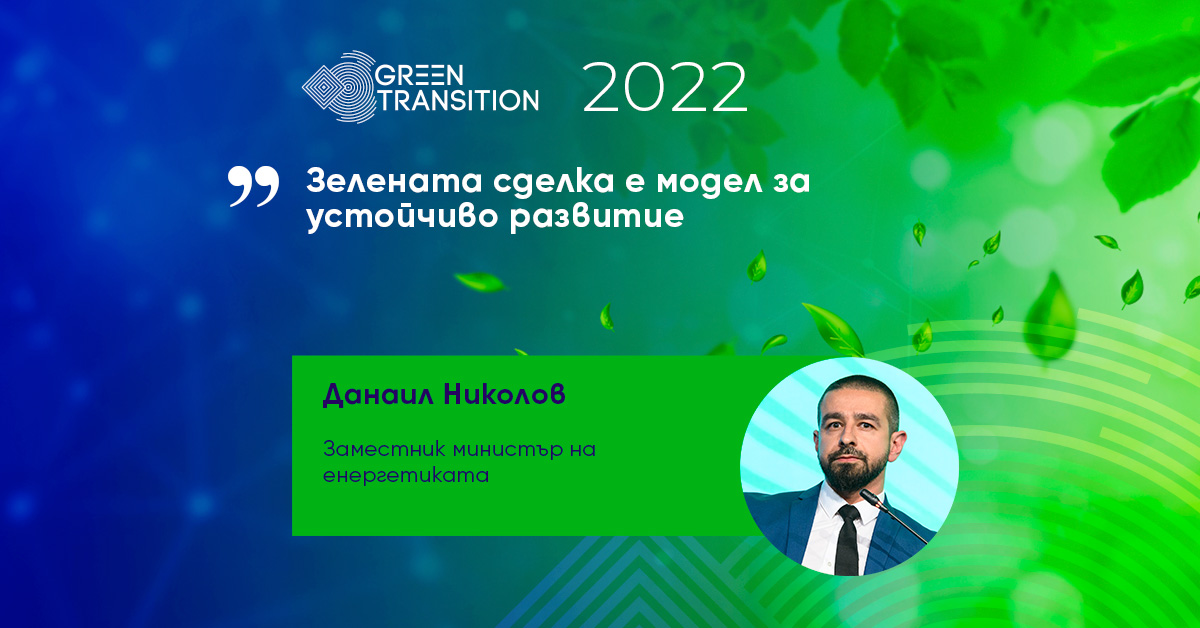The Green Deal is a model for sustainable development, said Danail Nikolov, Deputy Minister of Energy, during the international forum “The Green Deal – Innovations, Investments and Just Transition”, which is held in Sofia and is organized by the media portal dir.bg and the specialized site for energy, ecology and economy 3e-news.net.
The forum is attended by representatives of institutions, European and Bulgarian experts, representatives of business and the non-governmental sector. BTA is media partner of the conference.
The deputy minister pointed out that after the unilateral suspension of gas supplies from Russia, the government has shown that it can handle their diversification and use all available energy resources in our country.
Danailov also said that the National Electric Company (NEK) is a completely green company that operates three pumped-storage hydroelectric power plants, although one of them is currently not in working order (PSHEP “Chaira”, which had an accident in March and is under repair).
Hydropower is the backbone of the green recovery, it’s been forgotten, I haven’t heard anyone comment on it, but if we’re talking about sustainability, we have to share that we’re not on the right track, he believes.
We need to talk about energy security, and in this respect, for me, Bulgaria has succeeded, said the deputy minister. According to him, our country is working hard on the diversification of nuclear fuel, which is currently supplied entirely from Russia. Efforts are also being made on new infrastructure projects related to natural gas supplies, and more specifically on the Greece-Bulgaria interconnector, because, according to him, it is clear that supplies of blue fuel cannot continue to come from Russia.
Vladimir Malinov, executive director of Bulgartransgaz, said that the Green Deal is not a new topic from the point of view of living environmentally friendly. Energy should be affordable, secure, something every family can afford and green. Natural gas is not a dirty word, although today it is perceived as a symbol of dependence, but natural gas is not only Russian, Malinov pointed out. He expressed the opinion that gas will be the fuel of the transition. According to him, the project to expand the gas storage in Chiren will allow us to reduce our dependence, as well as better price levels of the blue fuel.
We are working on several projects with the operators in the region, but we also need the financial support of the EU, because this transition is expensive, science and innovation must be supported so that the existing networks can be transformed in the cheapest way, he said. The goal is for them to be able to transfer hydrogen over time. There will always be a need for infrastructure that is sustainable and predictable so that energy can reach people, Malinov said.
Angelin Tsachev, executive director of the Electricity System Operator (ESO), said that the green transformation will be part of our lives for the next 20-30 years while this transition period is going on, and this is the beginning of something better for us and for the whole Europe. We must try as quickly as possible to go down this road. RES are irreplaceable and there should be no other way of thinking, they are the tool that will give us the opportunity to achieve greater independence, but with only renewable sources we will hardly be able to cope, he said. At this point, our electricity system and energy mix are extremely well balanced. We can have some problem with the adequacy of no more than 4 hours a year, unfortunately in a large part of the European countries, which rushed to connect a large number of RES, this is no longer the case, explained the ESO director.
Tsachev said that the entire green transition must take place under the conditions of preserving the adequacy of the energy system and the security of electricity supplies to every consumer. This, he says, means a gradual reduction in coal and gas generation and a gradual introduction of renewables, while developing storage systems to allow renewables to be balanced. According to him, nuclear energy has no alternative, and the green transformation in the specific country must find its own model. He gave an example that in a country like Germany, wind energy is used as a base, but this cannot happen in our country.
According to him, at the moment, Bulgaria is the main exporter of electrical energy in the region of South-Eastern Europe – 10 million megawatt hours were exported and consumed last year. Regarding renewable sources, he said that 21,000 megawatts have already been submitted for grid connection, increasing monthly by 3-4,000 megawatts. In addition, small projects in the medium voltage network develop faster, which also means a serious load on it.
The general manager of Schneider Electric for Bulgaria, Albania, North Macedonia and Kosovo – Radoslav Koshkov, said during the forum that it is normal for technology companies to have sustainability programs and to be ahead in this regard. The green transformation has two aspects – technology and people, which we often overlook, but this is the part that makes the transformation, he pointed out.
“Schneider” has such a program, in which the team in each country presents its plan, what priorities it will cover. One of the initiatives involved working with universities and interns to work in roles affecting this sustainability agenda. We produce smart technologies that give us the solution to how to use energy more efficiently, he said, adding that the crises that hit us, such as the pandemic, accelerate digitalization. Koshkov said that young people come to the company prepared on this very topic with ideas and requirements on how to be greener in our daily lives as people and in business.
/TM/
